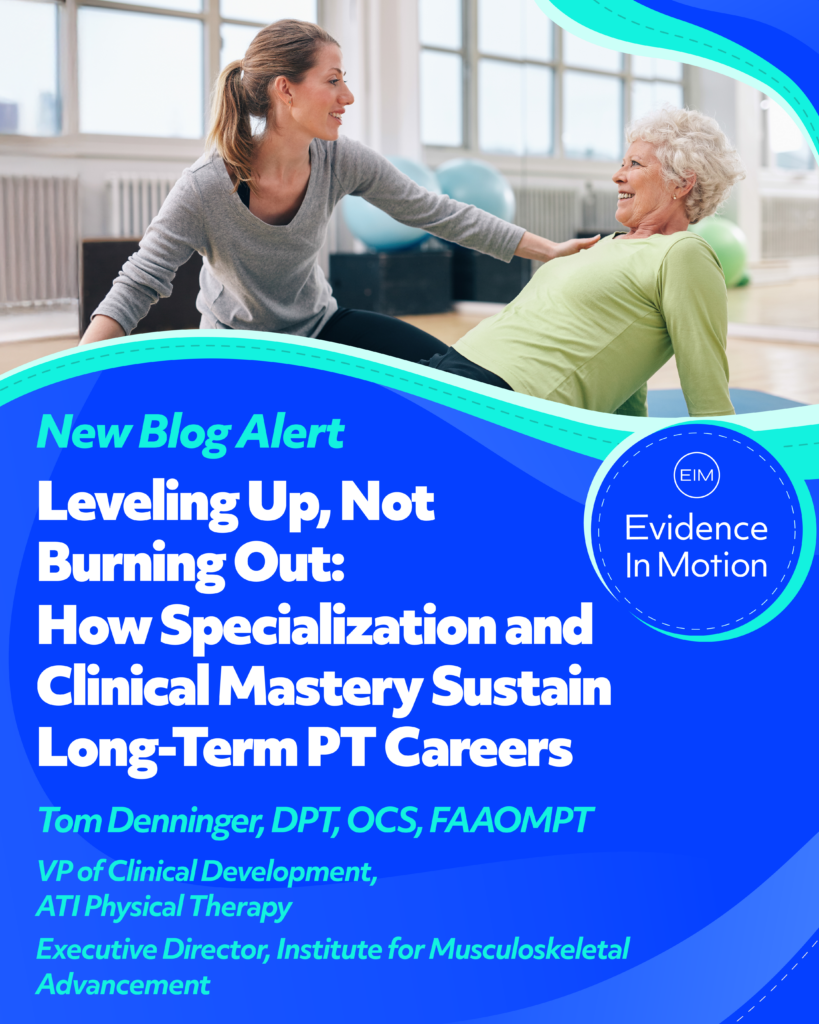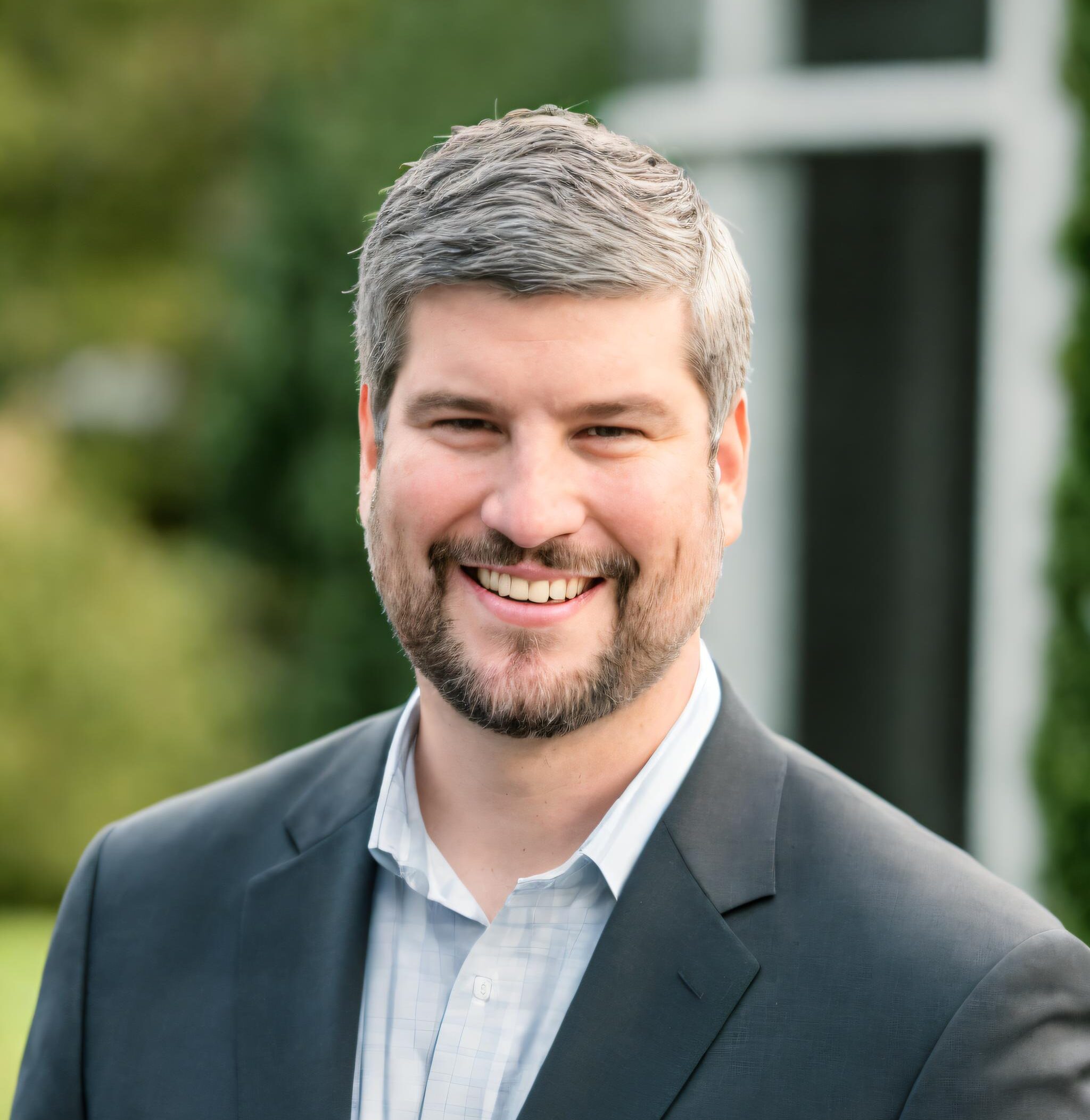
In our last post, we explored the rising tide of burnout among physical therapists and the increasing trend of professionals leaving the clinic for non-clinical roles. But what if the answer isn’t always a pivot away from patient care, but a deeper dive into it?
For many PTs, the key to longevity isn’t found in leaving the clinic, but in evolving within it. Specializing in a specific population, condition, or treatment philosophy, and developing more sophisticated clinical reasoning, can reignite purpose, boost autonomy, and make daily care more rewarding and less draining.
Burnout often stems from stagnation, not the work itself
Ask a burned-out clinician why they’re struggling, and you’ll often hear frustration about monotony or lack of growth:
“I see the same three evals every day.”
“I feel like I’m on autopilot.”
“I’m just chasing productivity numbers.”
This isn’t just emotional exhaustion, it’s a loss of intellectual stimulation and clinical identity. PTs enter the field because they love solving complex movement problems, not checking off visit counts. Without opportunities to deepen expertise or meaningfully influence patient outcomes, it’s easy to become disillusioned.
Clinical mastery, by contrast, offers a way to break the monotony, sharpen your skill set, and reignite curiosity, key ingredients in professional sustainability.
Specialization increases autonomy, mastery, and meaning
Research consistently shows that burnout is reduced when professionals feel:
- Autonomy – control over decisions and treatment direction
- Mastery – a sense of growth and skill advancement
- Purpose – clear connection between effort and impact
Specialization delivers on all three.
| Benefit | How Specialization Helps |
| Autonomy | Specialists are more trusted by peers, patients, and referring providers to make clinical decisions without micromanagement |
| Mastery | Focused study leads to improved outcomes, better pattern recognition, and deeper satisfaction from solving complex problems |
| Purpose | Working with a clearly defined population (e.g., post-op shoulders, pelvic health, neuro-rehab) builds identity and meaning |
A 2023 survey from the ABPTS (American Board of Physical Therapy Specialties) found that 84% of board-certified specialists reported greater career satisfaction after certifying, and 67% felt their daily clinical work became more rewarding and sustainable post-specialization.
Clinical reasoning: the antidote to emotional exhaustion
While specialization focuses your clinical lane, clinical reasoning is the engine that powers joy in that lane.
Therapists who feel like they’re “doing the same thing for every patient” often aren’t lacking compassion—they’re lacking a framework for complexity. Clinical reasoning helps clinicians shift from protocol-based treatment to patient-centered problem solving. This transition allows for greater personalization, fewer dead ends, and a stronger therapeutic alliance.
“When I started thinking critically—not just reacting—I felt like a true professional again,” said one orthopedic resident reflecting on his transition from generalist to specialist.
Clinicians with strong reasoning skills also manage setbacks better. Instead of feeling defeated when a patient stalls in progress, they think: What’s missing? What haven’t I ruled out? What other variables could be influencing this? That mindset alone reduces emotional fatigue.
Specialization opens new professional doors—without leaving the clinic
Burned-out therapists often feel trapped: “If I don’t want to be a clinic manager, where do I go?” But specialization unlocks multiple alternative tracks within clinical practice, including:
- Residency or fellowship faculty roles
- Clinical mentorship or preceptor programs
- Advanced practice (e.g., direct access, imaging privileges in some states)
- Speaking and teaching opportunities
- Referral relationships with surgeons and specialists
- Advanced payer negotiations and outcome-based care models
You don’t have to leave the table to change the game, you just need to evolve your seat at it.
Not all specialization requires board certification
Board certification (like OCS, SCS, WCS, NCS, etc.) is a powerful pathway, but it’s not the only one.
Other forms of focused growth include:
- Certification programs (e.g., McKenzie, Schroth, pelvic floor therapy, vestibular rehab)
- Micro-credentials or CEU-based content bundles
- Fellowship training
- Academic partnerships for clinical research
- Internal mentorship programs
Even self-guided pathways, like curating your caseload, subscribing to topic-specific journals, or forming a peer case-discussion group, can offer protective benefits.
The common denominator: You’re choosing what you want to grow into, rather than being pulled by someone else’s demands.
Clinical depth → patient connection → professional meaning
Patients can sense when a therapist is truly dialed in—not just going through the motions. When your expertise grows, your confidence improves. When your confidence improves, your communication and connection deepen. And when your connection deepens, so does your impact, outcomes, and fulfillment.
Specialists often report deeper relationships with their patients, more trust from referring physicians, and more “wins”—cases where they helped someone who’d given up hope. Those are the moments that refill your emotional tank and keep you coming back the next day.
From survival to sustainability
Burnout doesn’t mean you’re in the wrong profession. Often, it means you’ve hit a growth ceiling—and it’s time to level up.
If you’re feeling the early signs of disillusionment or exhaustion, try asking:
- What kinds of cases do I love and want more of?
- What clinical problems do I wish I understood better?
- Who in my network is practicing in a way that inspires me?
Start there. Build toward that. You might be surprised how quickly joy returns once your brain is challenged and your purpose sharpened. Through specialization and deeper clinical reasoning, you can transform repetition into expertise, frustration into curiosity, and fatigue into fulfillment.
Don’t let burnout have the final word. Let it be the signal that it’s time to evolve—not exit. Your career can still stretch decades ahead. Let’s make those decades meaningful, sustainable, and grounded in clinical excellence.
Thinking about your own specialization journey? Reach out to mentors, residency directors, or professional associations like APTA or ABPTRFE to explore your next steps.
